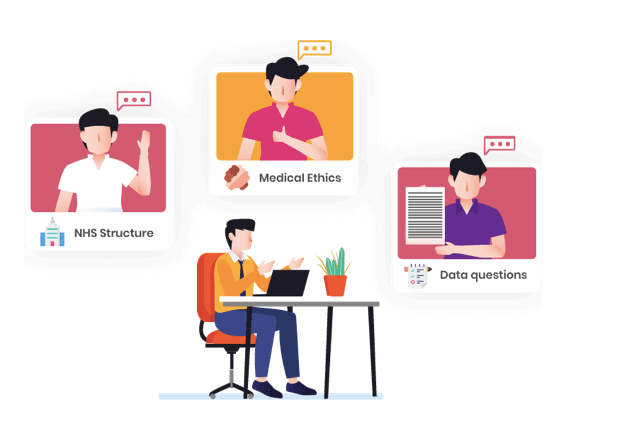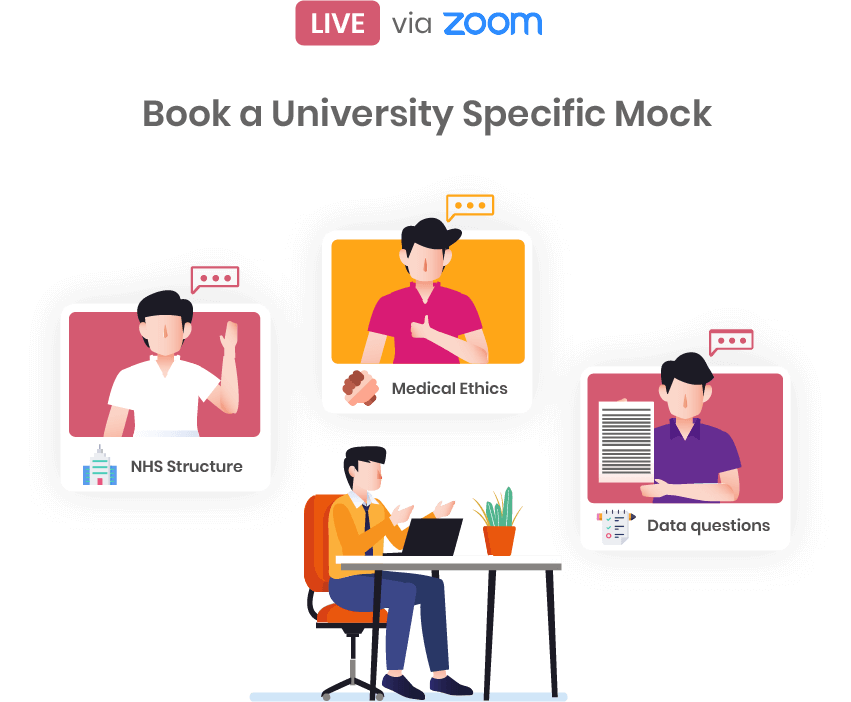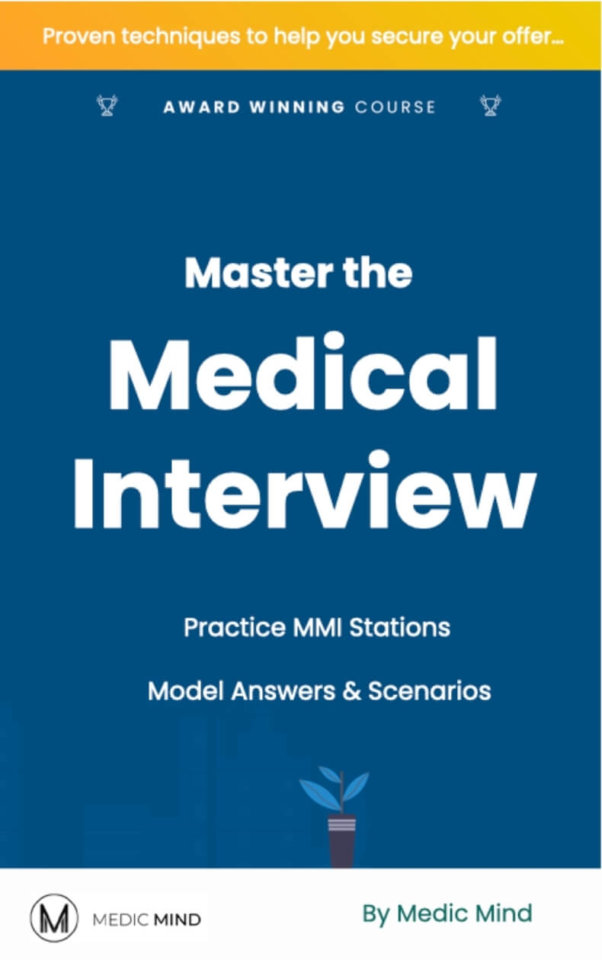Loading...


Leicester University Medicine Interview Questions
This article was updated in December 2023 with the latest information, and we will continue to regularly update it!

In this guide we provide an expert insight into past University of Leicester MMI stations, the University of Leicester medicine interview day and tips for converting your University of Leicester interview into an offer!
How Is Leicester Interviewing for 2024 Entry?
What is the University of Leicester medicine interview style?
Leicester has returned to face-to-face interviews for 2024 entry. The MMI circuit will likely involve 8 stations, each 7 minutes long with 1 minute reading time.
When are the University of Leicester medicine interview dates?
Interviews for 2023/24 entry to Leicester Medical School are currently scheduled to take place face-to-face between December and February.
These are subject to change if necessary. You will be invited to book your own interview date using the online electronic booking system. If you cannot attend any of the dates available, contact the Medical Admissions Team on +44 (0)116 252 2969 as soon as possible after receiving your invitation to interview.
What are the common topics for the Leicester Medicine Interview?
- Motivation to study medicine and genuine interest in the medical profession
- Insight into your own strengths and weaknesses
- Ability to reflect on your own work
- Personal organisation
- Academic ability
- Problem solving
- Ability to deal with uncertainty
- Ability to manage risk and deal effectively with problems
- Ability to take responsibility for your own actions
- Conscientiousness
- Insight into your own health
- Communication skills, including reading, writing, listening and speaking
- Teamwork abilities
- Ability to treat people with compassion, respect and dignity
- Resilience and the ability to deal with difficult situations
- Empathy and the ability to care for others
- Honesty
- Emotional intelligence
- Ethical judgement
How many interviewed applicants received an offer from University of Leicester?
Last year, there were 3,658 applications and 1,351 interviews were held. 538 offers were made for 290 places.
At Medic Mind we’ve helped many students secure offers from Leicester and other medical schools. If you’re applying to Leicester, we can do a high quality 1-1 mock with you with an Leicester tutor and realistic stations uniquely for Leicester.
Boook a Universities Specific Mock

List of Recent University of Leicester Medicine Interview Topics
| Theme | Leicester Example Questions |
|---|---|
| Data Interpretation & Numerical Analysis | Simple calculations |
| Video Observation | Evaluate clinical and communication skills Why is teamwork important? |
| Communication & Role-Play | Guide an individual/actor through a simple task Be encouraging |
| Motivation for Medicine | What challenges do doctors face? What motivates you to study medicine? |
| Personal Qualities | What are your strengths? Give examples of when personal qualities of yours have influenced the outcome of a situation |
| Video Observation 2 | Why is the role of a GP important? Discuss the GMC Guidelines and Duties of a Doctor |
| Article Evaluation | NHS Hot Topics Wider Reading |
| Communication & Role-Play 2 | Demonstrate empathy |
If you would like to practice for the Leicester Medicine Interview, have a go at the following questions and check out our video on approaching MMI role plays here
- When should problems in a healthcare setting be reported to a higher authority?
- Why is confidentiality important? (You can also check out our interview video on confidentiality here
- A patient is prescribed 50mg, tablets are 12.5mg each: how many tablets will you give?
- A drug is available as 20mg/5ml: your patient’s prescription is for 40mg, how many ml will be given?
- Talk about something you’ve recently read that is related to medicine

A Leicester Medical Student’s Perspective
Name 3 Reasons why you picked Leicester
- Reason 1 – The course structure
Leicester’s course structure is very well organized because it allows integration of key baseline knowledge during your first few years and then really helps it integrate it into clinical years during third to fifth year. Unlike other universities they integrate their clinical knowledge in first and second year as well by having clinical bedside teaching, dissections on cadavers and through interactive group work. The modules that are taught really prepare students for the clinical years. The clinical years are organized in general specialties and then extend into focusing on specific specialties in fourth year. This allows students to have a lot of time on a specific ward, in comparison to other universities where you are only able to spend a week or two on those specialty wards. - Reason 2 – The environment
The Leicester university has a really lovely modern medical school building very separate to the actual university. It allows students to really get to know their year. Especially since there are societies under the medical school catered towards medical students due to their schedule not aligning with the events of some of the main university societies. The city center always has something exciting to do with their vast number of food places and activities. - Reason 3 – The teaching.
Leicester has a brilliant set of professors, clinical health care professionals and clinical teaching fellows which are very skilled in explaining the difficult concepts in simple terms. They are always very welcoming and extremely easy to approach if the student has any questions or needs more help with the concept. The feedback that they receive from the students on regular basis also gets acted on very quickly. In general, the staff at Leicester has always been really helpful in both academic and non-academic issues.
What makes Leicester unique to other medical schools?
Leicester has a dissection room which is used the most in first year. Prior to the dissection day students are provided with some pre-reading on the topic being taught. They get provided with a workbook which has all the notes. Then they go through the information through lectures, apply that knowledge in group work and proceed to dissect that part of the body on cadavers. By the end of the day students have consolidated the same information in 4 different ways which really strengthens their understanding of anatomy.
Additionally, Leicester really recognizes the emotional challenges that come with being a medical student. They have included ‘Health Enhancement Programme’ in their course that teaches students research supported ways to manage your mental health and encourages practice of healthy habits like meditation. Equally, they allow students to choose your clinical partners in clinical years which makes outblock placements really fun and less stressful since they have their support system there in times of difficulties.
Insider Guide: University of Leicester Medicine Interview Day
How did you use the information provided at each University of Leicester MMI stations?
Pick out the key points of the scenario and think what skills/knowledge they want you to demonstrate. Remember – they want you to pass the interview! Try and link the scenario they give to key medical principles such as ethics or the GMC guidelines. Here’s an article on some model answers involving Medical Ethics.
What were the University of Leicester MMI examiners like? Did the University of Leicester medicine interviewers ask a lot of follow up questions?
All the Leicester medicine interviewers were quite friendly – if a candidate became stuck, they were helpful in asking follow up questions. Some of the role play stations could be less friendly because they want to see how you act in a situation that’s unfamiliar or awkward. Remember that it is okay to feel a little unsure if you just carry on the conversation and lead it towards resolving the situation. Follow up questions varied depending on the station. Some interviewers stuck to the questions on the instruction sheet outside the cubicle. It also depended on how well you answered them, if you covered all the points, they did not always ask any follow up questions.
Was there any guidance with timing at the University of Leicester medicine interview?
Some examiners cut you off if you begin to repeat yourself or when they get all they want for that question – and then move on to the next. Although it can be a bit disconcerting to be cut off, it’s probably because you’ve answered the question well, so they want you to move on. Try to allow the examiner to direct the interview in the way they feel is best to get the most from you.
What were the role-play stations like during the medicine interview at Leicester University?
There were two role-play MMI stations assessing different skills. The actors responded well to candidates’ attempts at building rapport and trying to find a solution. The most important point is to take it slowly and build an introduction/rapport (depending on your role) before steering the conversation towards the relevant issue. Remember to demonstrate empathy and be prepared to show off those acting skills!
What were the other Leicester MMI stations like?
The ethical questions were relatively straightforward – they sometimes used a video or an article to highlight a scenario, after which they asked you questions about it. Just remember to relate all your answers back to the GMC guidelines, the Duties of a Doctor and the pillars of medical ethics. It’s also good to mention some relevant current events that can be used to emphasise your point, but only do this if its relevant! As for the personality station they asked questions about how you’ve developed your personal qualities. They did want examples but be careful of time constraints, so try to prepare want you want to say for that station during your reading time. For the data interpretation stations they gave an article to read. Keep the key points in your head and make sure you can briefly summarise the article, as well as think of the wider impacts on healthcare and society.
How are the the Leicester University medicine interviews scored?
Each applicant is given a score for every station and this is totaled up to give an overall score. For 2020/21 this was a score out of 105 and applicants with a score with 85 or above were offered a place.
How long did it take you to hear back after your Leicester University medicine interview?
This can vary, for example a candidate who had their Leicester interview in December heard back in February. Offers continued to be given out till around March/April time.
Top Tips for Leicester Medicine Interview
- Go over your personal qualities and how you’ve developed them – most of all, what did you learn through these experiences. How will they make you a better doctor?
- Reflect on your work experience – and how it shaped your motivation to become a doctor. Show your understanding of the challenges and mention why your motivation outweighs the challenges.
- Practise difficult role play scenarios with friends and family – it’s definitely one of those skills that only becomes easier with practise. If you practice difficult role plays before the interview, this will help your thinking and approach. Always consider how the role play relates to the necessary skills of being a doctor. For example, try ‘breaking bad news’ or ‘encouraging a patient’ as practice. We provide mock MMI interviews which include role-play stations through our interview lessons, find out more here MMI Interviews Tutors
- Read the GMC guidelines – and try to make links between interview scenarios and what quality they are assessing. Here’s a link to ‘Good Medical Practice’, which is a starting point Good Medical Practice
- Practise speaking slowly and making eye contact – easy things to forget in the stressful moment, and they can really improve how confident you seem.
- Be prepared for the communication skills station. Leicester loves communication stations whether this is roleplays, making you explain a task or showing you videos of consultations to comment on. The key for these stations is to be a good listener. Ask open ended questions at the start and then specifically pick on the verbal cues to continue the conversation. Use phrases of empathy and do practice coming off as empathetic too. If students ever find themselves struggling to continue the conversation, try questioning the information they have just given you. E.g: Patient: ‘I have been struggling to do anything’ Student: ‘What has been happening John, could you tell me more?’
- Give detail when giving responses. The best way to approach work experience questions is to give detail about the skills which were gained and then exploring what the student did specifically to gain those skills. E.g: ‘I improved my communication skills by ensure I was giving information in small chunks, at a slow pace and checking up on the person regularly to see if they were following’. And if appropriate make sure to make links how this skill would be beneficial for you as a doctor.
- Be knowledgeable about your NHS constitutions and GMC guidelines. It will be best practice for the student to know these well and for them to have practiced incorporating them in their responses. These can even be included in answers related to their motivation for medicine if appropriate.
Boook a Universities Specific Mock
Meet our Tutors from Leicester


Frequently Asked Question
→What are the types of interview questions asked at the Leicester University Medicine Interview?
The Leicester University Medicine Interview consists of both traditional and MMI (multiple mini-interview) format questions. The traditional questions may include questions about an applicant’s motivation to study medicine, personal experiences, and ethical considerations. The MMI format may include scenario-based questions, communication and teamwork skills, and problem-solving questions.
→Can you provide sample interview questions that are normally asked during the interview at Leicester University Medicine?
- Why do you want to do medicine?
- Why Leicester?
- What made you choose medicine, rather than other options?
- What did you want to do before medicine?
- What subjects did you study?
- What happens once you’ve graduated?
- What can you bring to the University?
→Who conducts the Leicester University Medicine Interview?
The interview panel typically consists of academic staff, clinicians, and medical students from the University of Leicester.
→What are the interviewers looking for in the Leicester University Medicine Interview?
The interviewers are looking for applicants who demonstrate motivation, communication skills, problem-solving ability, and a clear understanding of the role of medicine in society. They also want to see evidence of teamwork, leadership, and the ability to reflect on personal experiences.
→What happens after the Leicester University Medicine Interview?
After the interview, the interview panel will make a recommendation to the admissions committee, who will then consider the applicant’s performance in the interview and other aspects of the application before making a final decision on admission.
→How important is the Leicester University Medicine Interview in the admission process?
The Leicester University Medicine Interview is an important part of the admission process and is used to assess an applicant’s suitability for the course. It is usually conducted after the academic assessment of the application, including the BMAT score.





Was this article helpful?
Still got a question? Leave a comment
Leave a comment